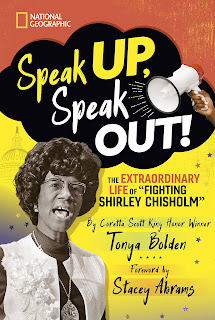 |
| Call Me Miss Hamilton: One Woman’s Case of Equality and Respect by Carole Weatherford Boston; Illustrations by Jeffery Boston Weatherford Millbrook Press, an imprint of Lerner Group, Inc. 2022. |
Everyone deserves respect. To be addressed as Miss, Mrs, or Mr.
Mary Hamilton was taught respect by her parents, by the nuns in her catholic school, and college. Yet, even in states that outlawed segregation, where African Americans were barred from many places, whites addressed African Americans “out of their names.” Grown men were called “boy;” grown women called “girl” or “auntie.”
Mary believed that by addressing someone by proper titles showed courtesy and respect.
In 1960’s Mary joined the Freedom Riders. She was jailed many times. In Alabama, she was held in contempt of court for five days for refusing to answer when a white prosecutor called her Mary instead of Miss Hamilton. In 1964, Mary took her case to the United States Supreme Court and won. “The highest court in the land ruled in Mary’s favor, deciding everyone in court deserved respect.”
Call Me Miss Hamilton includes an author’s note, timeline, and suggestions for further reading.
Click here to read an interview with Carole Boston Weatherford and Jeffery Boston Weatherford.
A must have for all libraries, school and public.
Another contender for ALSC/ALA awards.





